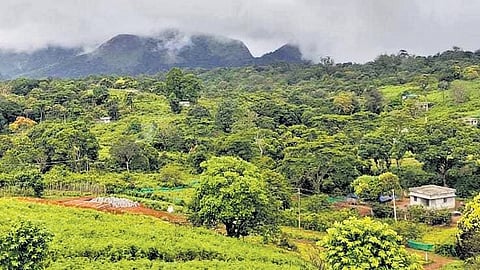

NELLIYAMPATHY (PALAKKAD): “How can a government give us titles and then deny us the right to prove we own the land?” asks Manoharan, his voice trembling with a mix of anger and heartbreak. A member of the Malasar tribe in Nelliyampathy residing in the Bhagavathi Mooppan Tribal Colony, Manoharan is among 127 tribal families caught in a cruel paradox - granted land titles after a 16-year-long struggle, yet they are being denied the basic right to pay tax in their own names.
The land ownership titles, or pattayas, were distributed in 2018 to 127 tribal families from the Malasar and Irular communities during a highly publicised government function in Palakkad by the then government. The gesture was seen as a long-overdue acknowledgement of their fight for land, which began in 2002 - a few weeks ahead of the well-known Muthanga land agitation.
“It took 16 long years for the authorities to finally allot one acre each to 127 families,” 52-year-old Manoharan told TNIE.
“Today, 186 families are living on the land, which was once part of the state-run Nelliyampathy Orange Farm. But even now, we can’t pay land tax in our names. What kind of ownership is this?”
The problem, according to officials, lies in the fact that the allotted land was originally classified as a forest village. The subdivision records necessary to complete the transfer of ownership are still being prepared. As a result, local village offices have refused to process tax payments, citing jurisdictional limitations under the forest department.
“This is not just about land tax. It’s about dignity, recognition, and the right to live without fear of eviction,” said V S Prasad, a local political leader who has been supporting the tribal community’s demands. “Without proper documents and recognition, these families remain vulnerable, despite the pattayas in their hands.”
When contacted, officials at the village and taluk offices confirmed the delay. “We are aware of the issue. The land falls under a forest village, and the subdivision records are still pending. A government-level decision is needed to transfer the land to the revenue department. Until then, our hands are tied,” said a senior official on condition of anonymity.
Tribal rights activists argue that the delay exposes a deeper systemic failure in the implementation of land reforms meant to uplift marginalised communities. The situation also raises concerns about administrative accountability in a state often celebrated for its progressive social policies.
When contacted, Forest Minister A K Saseendran told TNIE that the issue had not come to his attention until now. “If they have been unable to pay land tax for so many years, it is certainly a matter that needs to be addressed. I will direct the department head to submit a status report immediately,” the minister said.
As the families continue to live in legal uncertainty, rights groups are calling for urgent state intervention to ensure that the pattayas are honoured not just ceremonially but through actual, enforceable rights.